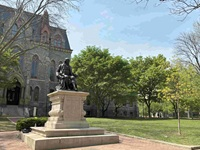Speaker
Description
Superconducting qubit sensors are a compelling option for detecting faint signals from dark matter or low energy neutrino interactions. Improving their reach calls for both signal amplification and background suppression. The Quantum Zeno Effect (QZE)--which governs how entanglement reshapes a quantum system's time evolution--addresses both needs. By quantifying these modified time dynamics, we can better predict a qubit's response to a genuine particle event while suppressing coherence dips from other local disturbances. We present a new QZE-based protocol that could mitigate a dominant source of coherence fluctuations from Two Level Systems, show initial measurements of the QZE in superconducting qubits, and discuss additional opportunities where understanding and exploiting the effect are critical for building robust, high-sensitivity qubit detectors.

